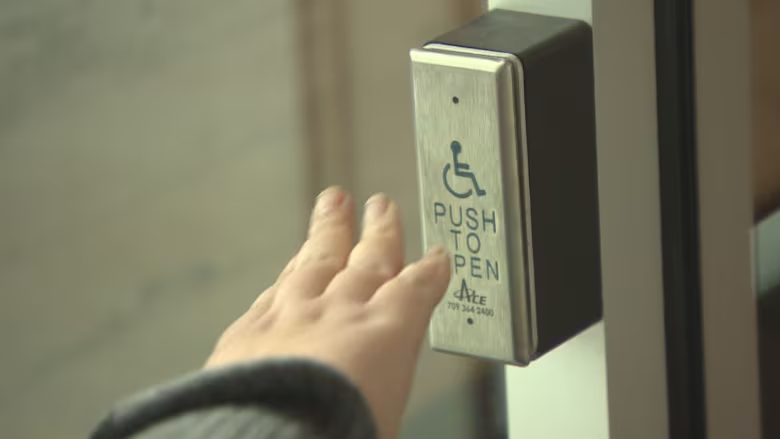Major Canadian cities lacking in accessibility for people with disabilities, says study
Study says 60% of public spaces in Calgary, Vancouver and Ottawa not fully accessible.

A report from the ‘Mapping our Cities for All’ project, led by the University of Calgary, suggests nearly 60 per cent of public spaces in Calgary, Vancouver and Ottawa are either inaccessible or partially inaccessible to people with disabilities. Eddy Kennedy CBC
Bill Graveland,![]() CBC Calgary November 29, 2023
CBC Calgary November 29, 2023
New research suggests nearly 60 per cent of public spaces in Calgary, Vancouver and Ottawa are either inaccessible or partially inaccessible to people with disabilities.
The report comes from the University of Calgary-led “Mapping our Cities for All” project and is aimed at helping the federal government meet its goals under the Accessible Canada Act of removing barriers for people with disabilities by 2040.
Of the three cities, the research found Calgary finished last with 35 per cent of buildings mapped deemed accessible.
That’s compared to 48 per cent in Vancouver and 53 per cent in Ottawa.
“There hasn’t been a clear understanding in Canada as to what barriers people with disabilities face,” said Victoria Fast, an associate professor in the department of geography at the University of Calgary.
“When the Government of Canada enacted this legislation, they acknowledged ‘we need a better understanding.’ It’s our job to help them understand and support them in their goals.”
The study used geographic data and insights from people with first-hand experience with disability.
Factors taken into consideration include the ability to get into parking spots, building entrances and washrooms, as well as general categories such as lighting, the height of tables, spaciousness, digital menus and customer service.
The information has been released by AccessNow, in collaboration with the University of Calgary and Spinal Cord Injury Canada.
AccessNow provides a free crowdsourcing mobile app that collects and shares accessibility information for cities across Canada.

Maayan Ziv, founder of Access Now remembers Arruda for his warmth but also his contrasting sharp jokes about living with a visible disability. CBC
“Only once we measure access, can we improve it,” said Maayan Ziv, founder and CEO of AccessNow.
“By using the collective experiences and perspectives of people with all forms of disabilities, we can drive meaningful progress towards a more inclusive Canada.”
Fast and Ziv are encouraging other Canadian cities to join the mapping efforts.
The 2017 Canadian Survey on Disability found more than six million Canadians age 15 and over — 22 per cent of the population — identify as having a disability.
Bill Graveland is a Calgary-based reporter for The Canadian Press.
![]() Source CBC Calgary
Source CBC Calgary
Also see
☞ Number of Canadians with disabilities doubles in 10 years, hits 8 million: StatCan The Canadian Press
Kids’ emergency rooms are crunched in Canada. What parents should know Global News
Major Canadian cities shut out disabled people, study finds Holland Bloorview Kids Rehabilitation Hospital
Montreal man fed up with delivery companies ignoring instructions to meet mobility needs CBC
Access Now uses crowdsourcing to pinpoint accessible businesses CBC
Comedian Andre Arruda remembered as a trailblazer for an accessible Toronto CBC
App helps people with disabilities determine, document building accessibility CBC
Toronto engineer honoured for building accessible ramps CBC
